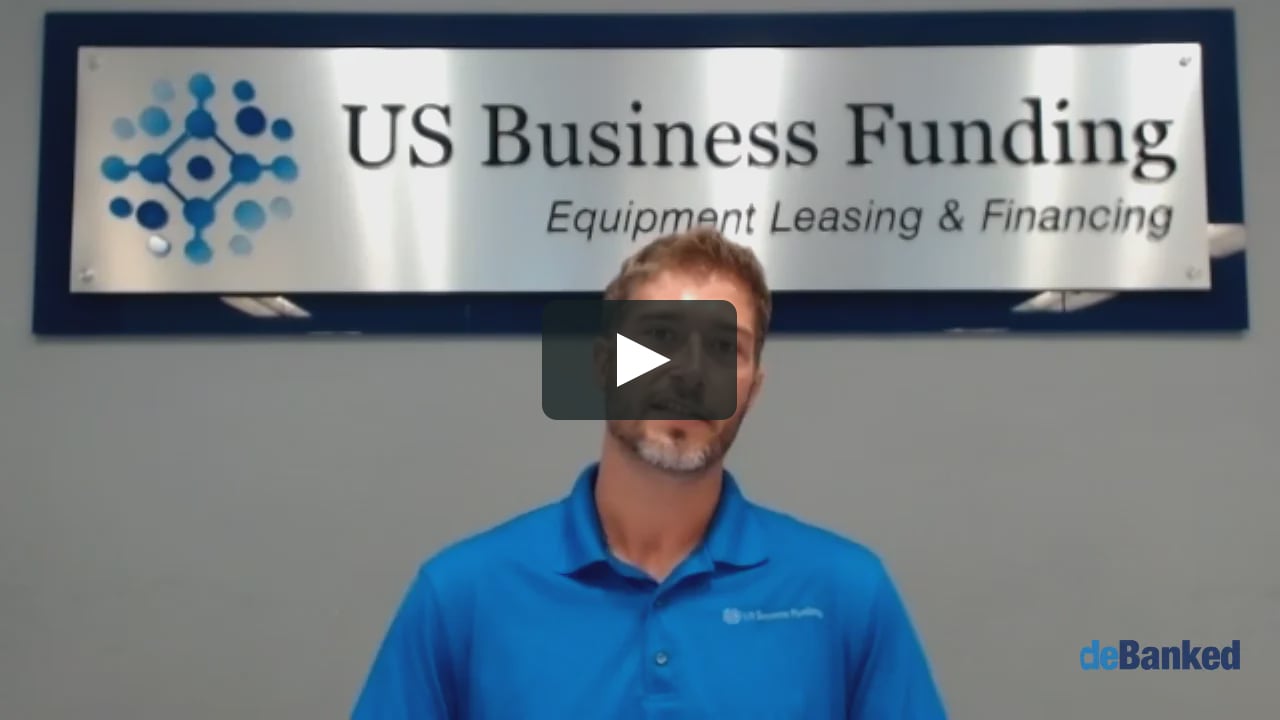Related Headlines
| 06/07/2018 | US Business Funding will keep their name |
| 06/05/2018 | Fora acquires stake in US Business Funding |
Related Videos
Interview with Peter Ribeiro, US Business Funding - With deBanked |
Stories
Peter Ribeiro, CEO of US Business Funding – Talks About Experience and Success in 2020
September 17, 2020I recently caught up with Peter Ribeiro, CEO of US Business Funding, based in Santa Ana, California. US Business Funding is quite well known on social media for their company culture.
I asked Ribeiro about what 2020 has been like as a broker in this wild year of 2020 and you can watch it in full below:
US Business Funding Will Retain Name & Special Sauce in Wake of Fora Deal
June 8, 2018Fora Financial’s announcement yesterday that it acquired a sizable stake in US Business Funding (USBF) will create one of the “largest, broadest reaching direct sales organizations in the small business alternative lending space,” the company said in a statement.
USBF is a direct sales and marketing company of about 40 to 50 people. Fora Financial founder and CEO told deBanked that his company started working with USBF to obtain leads two years ago and that this acquisition has been in the works for between 12 to 18 months.
 Jared Feldman, CEO, Fora Financial
Jared Feldman, CEO, Fora Financial“We were looking for a team that does direct sales and marketing that complements what we do,” Feldman said. “And they’re one of the best at [direct marketing] in the business.”
USBF is based in Santa Ana, CA, and has connected customers to financing since 2008, with an emphasis originally on equipment financing. In 2012, they started facilitating working capital deals and that now makes up 85 percent of the company’s business, according to its CEO Peter Ribeiro.
They provide financing solutions ranging from $10,000 to $10 million. Fora Financial, also established in 2008, is a New York-based funding company that funds MCA deals and provides small business loans up to $500,000.
Consistent with yesterday’s announcement, Feldman said that with Fora Financial and USBF combined, they will likely originate $400 million year. Feldman told deBanked today that, of this amount, about $300 million should come from direct sales.
“We’re more heavily weighted towards direct sales,” Feldman said.
Formerly a company of 100, the new entity will now include about 150 employees and will share resources like capital, technology and access to help with compliance, Feldman said. USBF will retain its name, location and all of its employees.
“We wouldn’t have done this deal unless Peter [USBF founder and CEO] and his team agreed to stay on,” Feldman said. “They have a fantastic brand and we want to avoid getting in their way. We just want to help them to continue doing what they do.”
Feldman said that while USBF will retain its name, “we’re now a combined entity with an east and west coast operation.”
Fora Financial acquired USBF because it did something unique, and Feldman said that Fora is looking for opportunities to acquire other companies that do uniques things in the financing space.
$400M A Year: Fora Financial / US Business Funding Deal to Make Fora an Originations Leader
June 5, 2018 Fora Financial’s newly acquired stake (a significant one) in US Business Funding will put them on track to originate $400 million a year, the company said. Those numbers will place them on the list with industry titans like BFS Capital, Strategic Funding and National Funding.
Fora Financial’s newly acquired stake (a significant one) in US Business Funding will put them on track to originate $400 million a year, the company said. Those numbers will place them on the list with industry titans like BFS Capital, Strategic Funding and National Funding.
The co-founders of Fora were previously featured on deBanked’s Jan/Feb 2016 magazine issue.
US Business Funding (USBF), who is based in Santa Ana, CA facilitates different financing products for small businesses including vendor programs, capital equipment loans, and leasing solutions.
“This is an exciting time for all of us at US Business Funding,” said USBF CEO Peter Ribeiro in a published statement. “We have rapidly built one of the top sales organizations in the industry, and now we have the opportunity to leverage the expertise and resources of Fora Financial to fuel our growth even further. Jared and Dan have established Fora Financial as one of the top lenders in the space, and we are motivated to build on our terrific relationship with them to create even more opportunities for our companies to succeed.”
Shopify Capital’s Funding Business Grows in Q2
August 14, 2024Shopify Capital originated ~$700M in business loans and merchant cash advances in Q2. During the earnings call, Shopify CFO Jeff Hoffmeister referred to its Capital division as a “growth business” that had increased in volume. Shopify has otherwise seemed to downplay mention of this division since early last year. In terms of origination volume, the company is still not as big as Enova or Square Loans.
Shopify’s rival, Amazon, used to offer funding to its clients directly as well, but switched to referring its clients to third party lenders earlier this year.
Smart Business Funding Prevails in Trademark Lawsuit
July 3, 2024Smart Business Funding, the trademark owned by Collins Cash Inc, has officially survived a trademark infringement challenge brought by BillFloat Inc dba SmartBiz. Both companies began using their respective marks a decade ago and the two even had a partnership referral agreement at one point. However, in 2020, SmartBiz sent Smart Business Funding a Cease & Desist letter on the basis that it was allegedly infringing on its mark and causing confusion in the market. While they are both engaged in small business financing, each offers different products. SmartBiz eventually filed a lawsuit.
After the original trial went in favor of Smart Business Funding, the decision was re-examined on appeal. There, the United States Court of Appeals for the Ninth Circuit affirmed the original ruling. The Smart Business Funding mark does not infringe upon SmartBiz.
Looking at PayPal’s Business Funding Charge-Offs
June 10, 2024 When PayPal announced a sudden and dramatic pullback on its MCA and business loan operations in the third quarter of 2023, it was surprising news. For instance, the company’s net charge-off rate had been trending downward for years, coming in 7.4% at year-end 2019 right before covid and going down to 4.7% in 2021 and down to 4.5% in 2022. By June 2023, however, that number had somehow soared to 13.3% and by September was 20.4%. At the time, PayPal attributed this shift to “the expansion of acceptable risk parameters in 2022, which resulted in a decline in the overall credit quality of loans outstanding.” Because of how they calculate charge-offs, reducing originations at the same time that charge-offs were peaking made that number look a bit worse than it was. But still…
When PayPal announced a sudden and dramatic pullback on its MCA and business loan operations in the third quarter of 2023, it was surprising news. For instance, the company’s net charge-off rate had been trending downward for years, coming in 7.4% at year-end 2019 right before covid and going down to 4.7% in 2021 and down to 4.5% in 2022. By June 2023, however, that number had somehow soared to 13.3% and by September was 20.4%. At the time, PayPal attributed this shift to “the expansion of acceptable risk parameters in 2022, which resulted in a decline in the overall credit quality of loans outstanding.” Because of how they calculate charge-offs, reducing originations at the same time that charge-offs were peaking made that number look a bit worse than it was. But still…
Although many funding and lending companies have complained of an increase in fraudulent applications in the immediate post-covid era, PayPal’s figures can hardly be attributed to fraud. That’s because their charge-off rate doesn’t even include losses from fraud.
PayPal’s products are very short-term so it was able to rapidly scale back its balance sheet exposure. Total merchant advances and loans outstanding, net of participation interest sold, decreased from $2.1B in Q1 2023 down to $1.2B in Q1 2024. Of the active loans, 88.7% were considered current in Q1 and 4.4% were greater than 90 days beyond their projected payment pace. With the exception of 2020 (when the % > 90 days past expected hit 12.5%), 4.4% is among the worst PayPal has experienced since 2017.
Staying Vigilant in the Funding Business
April 15, 2024There’s a lot of funny business going on these days, so here are some things for you and your merchants to look out for:
The LOC Bait and Switch
A scammer offers the customer an impossibly good deal on a line of credit that is contingent on first entering into some other product. After the customer enters into the first transaction, the LOC offer and the scammer disappear. If your customer is susceptible to falling for something like this, make sure to advise them ahead of time accordingly.
The Mystery Funder
Despite a customer claiming to work exclusively with you as a broker, at some point a third party mysteriously enters the process and offers a separate deal to them to compete with you. Although there could be many reasons for this happening both legitimate or otherwise, including the customer not being completely forthright about exclusivity, you should communicate with your customer beforehand about who or who not to expect a communication from. Also, there are methods you can use to mitigate this by plugging up common attack vectors like an email address or phone # on a submitted application. Allow an attorney to guide you on how to do this most effectively and legally.
The Debt Advisor
Beware the debt advisor who claims they are there to help a merchant reduce the obligations of their loans or advances as many do not understand the contracts they claim to advise on. Because of this, they can potentially push a customer into a much worse situation than they otherwise might’ve been in. A merchant’s best bet is to communicate directly with the source of capital on their own. Oftentimes a contract spells out the proper protocol to follow depending on what the situation is.
 Pac-man
Pac-man
They got hot full packs for sale including bank statements, social security #s, and other data ready to send your way! Before engaging in any such transaction, please consult with an attorney about the potential implications of doing something like this. Same goes for you if you were thinking about “selling your declines.”
The Ghost
Brokers often complain about customers falling for obvious scams over the phone, including the classic LOC scam, however, brokers can be just as susceptible to the same tactics. Before working with any lender or funder, you should conduct a full range of due diligence on them. This includes investigating their precise address, who the owner is, what their background is, what their ISO contract says, what their merchant contract says, etc. Too often brokers are drawn in by a commission they believe they stand to make and a smooth talking biz dev rep they talked to on the phone and skip over all the fundamentals. If the funder turns out to be a scammer, then you’ve potentially placed customers with that scammer and put yourself doubly at risk. A commission isn’t worth waiving due diligence. The stakes are too high for this industry.
BusinessFunding.com Sells for $44,000
February 12, 2024 The world of domain name investors called out a big sale that took place on GoDaddy over the weekend. The domain is businessfunding.com and it reportedly sold for $44,000, according to Namebio which tracks sales when data is available. The whois information does not reveal who the buyer is at this time.
The world of domain name investors called out a big sale that took place on GoDaddy over the weekend. The domain is businessfunding.com and it reportedly sold for $44,000, according to Namebio which tracks sales when data is available. The whois information does not reveal who the buyer is at this time.
Other potentially high value domain names in the small business finance industry include businessloans.com and smallbusinessloans.com, each of which are standalone businesses.
Meanwhile:
loans.com was sold for $3 million 24 years ago and today redirects to the homepage of Bank of America.
businesslenders.com belongs to Business Lenders, LLC, which has since ceased its lending operations.
businesslending.com redirects to a bio page for a big real estate broker.
merchantloan.com redirects to Circadian Funding’s website.
revenuebasedfinancing.com redirects to Lighter Capital’s website.
lenders.com is a page that hasn’t been set up yet.
lending.com doesn’t resolve.
How important is a domain name to a business? Important enough that a business can hardly afford to lose one. And did you hear about the first domain name to ever be used as loan collateral over the blockchain? It just happened recently!
7-Year Industry Vet Just Completed an 3-year residency @ US Business Funding... breaking news!!! my 3-year residency @us business funding has officially completed. the ending of this relationship has me more optimistic about my n... |

See Post... us business funding. :rolleyes:... |
See Post... us business funding supposedly gave the merchant the offer, they are a broker so waiting to see if the deal is legit or a teaser.... |
See Post... us business funding before or after the merger?who is afn?, , i think advanced funds network, , ( this was an advertisement) lol, , , funding companies are... |






























